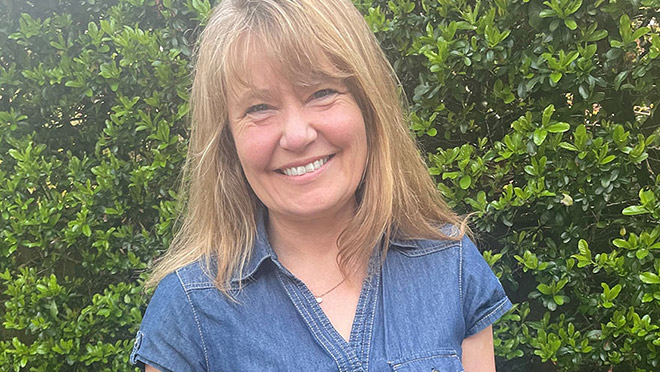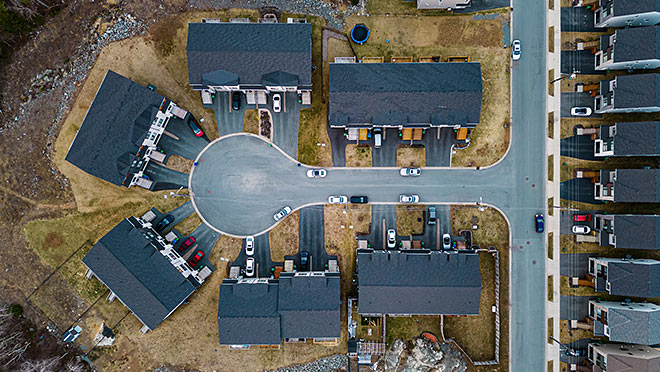May 2023
In this edition:
- Meet the City of New Westminster's new Community Energy Manager
- A handy resource explains the Zero-Carbon Step Code
- New projects in Saanich aim to help residents ditch fossil fuels
- Ramping up HVAC Contractor capacity in B.C.
- Announcing our next CEMx event
- Advanced Demand Side Management becomes Market Transformation

Introducing our new Community Energy Manager
Join us in welcoming Penny Page-Brittin, the City of New Westminster's new Community Energy and Emissions Specialist and one of the newest members of our network of Community Energy Managers (CEM).
Penny brings a wealth of experience to her role, including past work in community energy and environmental sustainability for the City of Delta and the City of Revelstoke. Penny is excited to continue to advance the work being done in New West, an early adopter of the BC Energy Step Code and EV-ready requirements for multifamily buildings.
Penny told us that New West brings unique opportunities as one of Metro Vancouver's more walkable, transit-friendly communities. "It's this small land area, smack dab in the middle of Metro Vancouver and the oldest community in British Columbia, but it's very dense, it's walkable and also transit-oriented with a lot of multifamily buildings." She added that "New West is going to be very challenging and exciting to work on to find solutions for retrofitting our existing MURBs (Multi-Unit Residential Buildings) to support EV charging and electrification as well as building new multifamily buildings to align with the CleanBC 2030 targets. I'm looking forward to being part of this transition and working with a climate-conscious, forward-thinking municipality like New West."
As a member of our Community Energy Manager network, Penny looks forward to working with other local governments to develop policy and support implementation. For Penny, being able to share knowledge and ideas with CEMs from other municipalities means that "you know you're not doing it alone."
In her spare time, Penny is an avid runner. "Being new to Metro Vancouver, I enjoy going to different places and running around in circles and kind of trying to figure out what makes that area tick, what's going on. Where do people live, what are they doing?"

A new resource sheds light on the Zero-Carbon Step Code
As B.C.'s new Zero-Carbon Step Code rolls out, many local governments and other stakeholders have questions about what the new, optional regulations mean for their communities. A new slide deck provides a clear, easy to use introduction to what the code is, how it works, and how local governments can implement it.
The slide deck includes information on buildings and climate change, an overview of the Zero-Carbon Step Code, compliance options with sample projects, and examples of proposed implementations. You can download the slide deck and use it for your presentations.
Get the slide deck [PPT]
The Province also released a series of technical bulletins to clarify specifications in the updated BC Building Code around:
- The application of the new energy efficiency compliance pathways [PDF]
- The Zero-Carbon Step Code [PDF],
- How the BC Building Code changes may affect local bylaws or incentives [PDF].
New projects from the District of Saanich help residents ditch fossil fuels
The District of Saanich, with funding from BC Hydro's Sustainable Communities program, recently completed two projects that will help encourage more low-carbon home retrofits in the area.
Saanich's "Make the Switch" program sifted through the before-and-after energy bills of British Columbia homeowners who had recently upgraded from a natural gas furnace or boiler to an electric heat pump, and found that two-thirds are now paying the same, or less, on their utility bills than they did before their switch – with the added benefit of air conditioning.
The report aligned with similar findings from BC Hydro's Bringing the Heat Report [PDF, 124 KB] that concluded heat pumps cost, on average, 12% less than heating with natural gas. As part of the project, Saanich developed a set of customizable communications materials, including videos, graphics and written materials, that other local governments can adapt for their own campaigns and uses.
Maggie Baynham, Saanich's Senior Sustainability Planner, told us that "one of the most common myths we hear from residents is that natural gas is the cheapest way to go when it comes to home heating, and that electricity is too expensive. We wanted to get real data from households that had switched from gas heating to a heat pump to better understand the operating costs and to help residents make choices that would increase the likelihood of cost savings. We're really excited about the findings and are planning to share the communications materials far and wide! Best of all, these materials were developed with the intent that other local governments can use them, so we're all sharing and reinforcing the same messages."
Learn more about the District of Saanich's Make the Switch study
Another project, "Addressing Data Gaps for Existing Buildings", aims to address gaps related to the energy and emissions profile of Saanich's existing building stock, and the impact of potential climate policy on reducing building emissions.
The project found that Saanich could potentially achieve a 59% greenhouse gas (GHG) reduction in existing buildings by 2030 and a 99% reduction by 2050. This will require 36% of single-family homes, 27% of rental apartments, and 15% of multi-unit residential building (MURB) condos switching from gas to heat pumps by 2030.
According to Maggie, "building retrofits can be very challenging for local governments to influence, and at Saanich we were worried that the actions we had in place might not get us to our climate targets. We were able to model, not just Saanich's policies and programs, but also the GHG reduction potential from the Province's commitments under CleanBC. The findings have informed our Building Retrofit Strategy and key priorities, and also confirmed that local government action in coordination with the Province is absolutely essential – without both, we are likely to miss both local and Provincial targets."

Ramping up HVAC Contractor capacity in British Columbia
Our Industry Partnership program is supporting a new Residential HVAC Trade Certification Roadmap to address the current needs for qualified residential heat pump installers and maintenance professionals in B.C. The roadmap is intended to align key stakeholders on how to update requirements for certifications to perform small residential HVAC work in B.C.
The Home Performance Stakeholder Council is leading the project with the support of Dunsky Energy. It will involve a baseline assessment of current installation conditions in B.C. for small residential HVAC work, case studies reflecting best practices in other provinces, and multistakeholder workshops to develop the roadmap.
Workshops will take place over the month of May and the final roadmap is expected to be complete in the fall of 2023.
For further information and to express interest in joining the roadmap workshops, please reach out to Dunsky Energy.

Announcing our next CEMx event
We are pleased to announce the dates of our next Community Energy Management Exchange (CEMx) event: June 19 and 20 in Vancouver. These events are a great opportunity to connect with a network of fellow energy managers, to learn more and share updates on current work related to energy management and climate action. This year, our theme will be market transformation to an electrified future. We welcome local government staff, Indigenous government representatives, industry associations, and related groups. If you're interested in attending, please email us.

Advanced Demand Side Management becomes Market Transformation
Our Sustainable Communities program is part of a larger team. We recently renamed that group Market Transformation (formerly Advanced Demand Side Management). This change is to better reflect the work our team does on large scale market adoption and implementation of zero-carbon, energy-efficient policies for buildings and transportation through:
- Working with internal and external groups to create and implement market transformation roadmaps
- Supporting the adoption of codes, policies and standards
- Partnering with government, community, and industry associations to drive large market adoption of new energy solutions
We're excited to continue to support our partners as they lead the way towards a sustainable and carbon-free future. If your organization is interested to hear more about our vision and action plan for a clean and electrified future, please reach out to us.